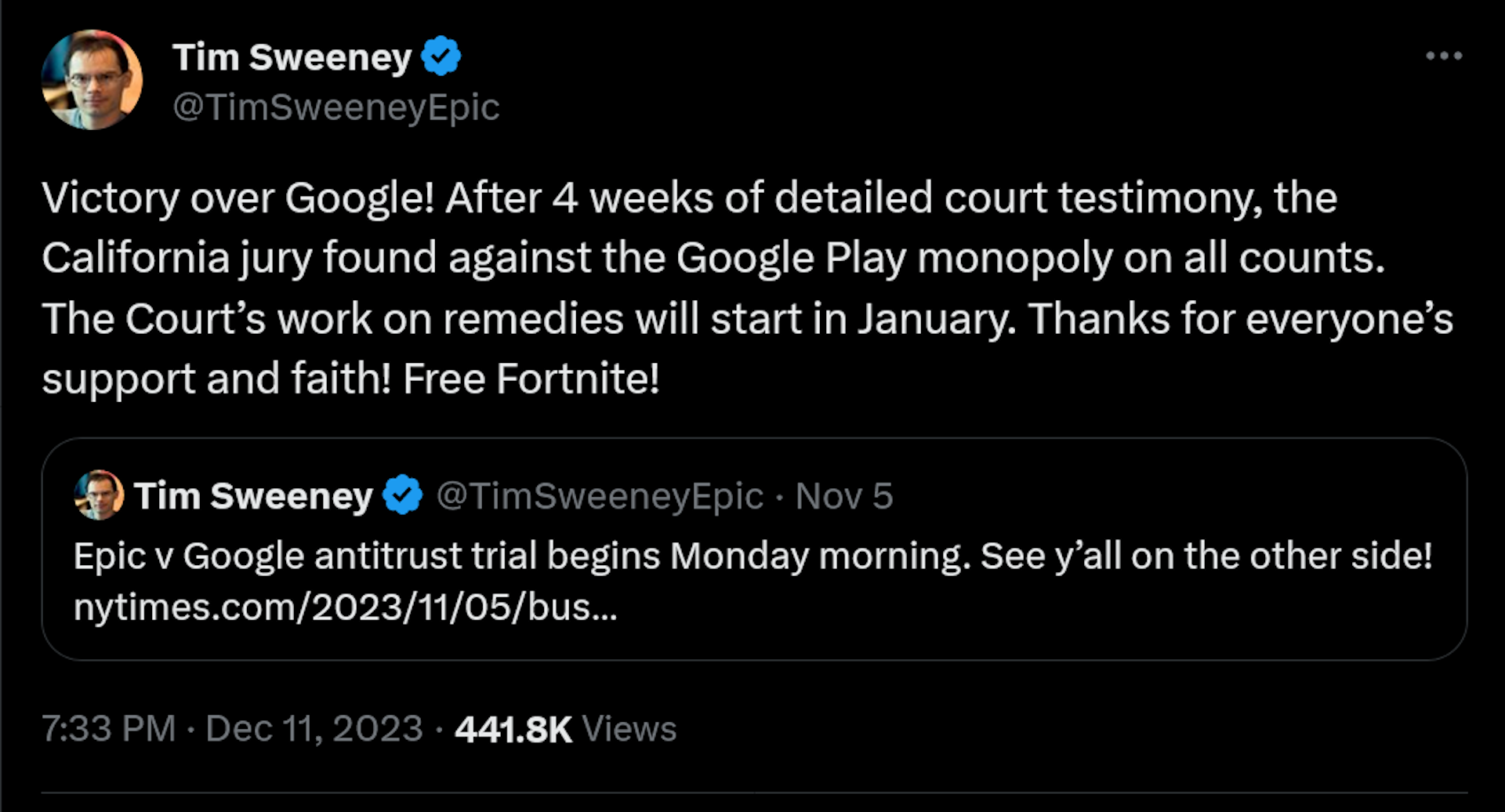Epic trumpets surprise victory in its lawsuit against Google: 'A win for all app developers and consumers around the world'
A jury sided unanimously with Epic's claim that Google has a monopoly on the Android marketplace.

The long-running lawsuit between Epic and Google has taken a surprising turn because, well, Epic seems to have won. After a brief deliberation, a jury has decided that Google has in fact engaged in anti-competitive behavior in order to establish a monopoly on Android app distribution and billing services.
The full verdict, available via CourtListener, is an across-the-board win for Epic: The jury found that Epic proved "the existence of a relevant antitrust market," that Google "wilfully acquired or maintained monopoly power by engaging in anticompetitive conduct" in that market, and that Epic suffered damages as a result.
That outcome stands in sharp contrast to the 2021 ruling in Epic's lawsuit against Apple, which went almost entirely Apple's way, including in the declaration that Apple does not have a monopoly on app distribution through its App Store. As an Android user myself, that feels a little weird: I can install third-party app stores or sideload APKs on my cheap Motorola pretty much at will, which is something my partner can't do on her fancy, hideously expensive iPhone.
But as noted by The Verge, this case was different from the Apple matter in a couple ways. For one, the outcome was determined by a jury rather than a judge, and it also seems to have hinged largely on deals Google made with other companies, such as Activision, to keep them from releasing competing app stores: The jury found that Google Play's Developer Distribution Agreement, as well as "agreements with Google's alleged competitors or alleged competitors" and OEMs, constituted "unreasonable restraints of trade."
Epic, of course, agreed wholeheartedly with the verdict, calling it "a win for all app developers and consumers around the world" in a blog post.
"These deals were meant to cement Google’s dominance as the only app store in town—and it worked," Epic wrote. "More than 95% of apps are distributed through the Play Store on Android.
"The evidence presented in this case demonstrates the urgent need for legislation and regulations that address Apple and Google strangleholds over smartphones, including with promising legislation in progress right now with the Digital Markets, Competition and Consumer Bill in the UK and the Digital Markets Act in the EU."
The biggest gaming news, reviews and hardware deals
Keep up to date with the most important stories and the best deals, as picked by the PC Gamer team.

It's not necessarily the end of the road, however. In a statement provided to PC Gamer, Google's vice president of government affairs and public policy Wilson White said the company will appeal the verdict.
"Android and Google Play provide more choice and openness than any other major mobile platform," White said. "The trial made clear that we compete fiercely with Apple and its App Store, as well as app stores on Android devices and gaming consoles. We will continue to defend the Android business model and remain deeply committed to our users, partners, and the broader Android ecosystem."
Epic's lawsuit against Google began in 2020, almost immediately after it filed suit against Apple over alleged "monopolistic practices." In both cases, Epic began offering mobile Fortnite players an option to purchase V-Bucks directly, bypassing Apple and Google's payment processing systems and the cut of in-app purchases they take. Google and Apple policies forbid the use of external payment processors on their mobile storefronts and they kicked Fortnite off their respective stores as a result, triggering Epic's legal action.
There's still a lot left to be decided. Epic has claimed the win but it remains to be seen what the judge in the case will award it as a result. Epic did not request monetary relief in its lawsuit against Google, "but rather only an order enjoining Google from continuing to impose its anticompetitive conduct on the Android ecosystem." How exactly that will be enforced given that the Android platform is already significantly more open than Apple's—which is not a monopoly, remember—remains to be seen.
Epic's legal fisticuffs with Apple are also still ongoing. Most of the 2021 ruling in Epic's suit against Apple landed in favor of Apple, but it also declared that Apple's policy of requiring developers to use the App Store's in-app payment system was a violation of California's Unfair Competition Law. Apple wants that part of the ruling tossed, and it announced earlier this year that it's appealing to the US Supreme Court.

Andy has been gaming on PCs from the very beginning, starting as a youngster with text adventures and primitive action games on a cassette-based TRS80. From there he graduated to the glory days of Sierra Online adventures and Microprose sims, ran a local BBS, learned how to build PCs, and developed a longstanding love of RPGs, immersive sims, and shooters. He began writing videogame news in 2007 for The Escapist and somehow managed to avoid getting fired until 2014, when he joined the storied ranks of PC Gamer. He covers all aspects of the industry, from new game announcements and patch notes to legal disputes, Twitch beefs, esports, and Henry Cavill. Lots of Henry Cavill.

